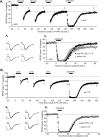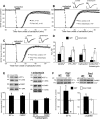Multiple Gq-coupled receptors converge on a common protein synthesis-dependent long-term depression that is affected in fragile X syndrome mental retardation
- PMID: 17959805
- PMCID: PMC6673232
- DOI: 10.1523/JNEUROSCI.2266-07.2007
Multiple Gq-coupled receptors converge on a common protein synthesis-dependent long-term depression that is affected in fragile X syndrome mental retardation
Abstract
Gq-coupled, M1 muscarinic acetylcholine receptors (mAChRs) facilitate hippocampal learning, memory, and synaptic plasticity. M1 mAChRs induce long-term synaptic depression (LTD), but little is known about the underlying mechanisms of mAChR-dependent LTD and its link to cognitive function. Here, we demonstrate that chemical activation of M1 mAChRs induces LTD in hippocampal area CA1, which relies on rapid protein synthesis, as well as the extracellular signal-regulated kinase and mammalian target of rapamycin translational activation pathways. Synaptic stimulation of M1 mAChRs, alone, or together with the Gq-coupled glutamate receptors (mGluRs), also results in protein synthesis-dependent LTD. New proteins maintain mAChR-dependent LTD through a persistent decrease in surface AMPA receptors. mAChRs stimulate translation of the RNA-binding protein, Fragile X mental retardation protein (FMRP) and FMRP target mRNAs. In mice without FMRP (Fmr1 knock-out), a model for human Fragile X syndrome mental retardation (FXS), both mGluR- and mAChR-dependent protein synthesis and LTD are affected. Our results reveal that multiple Gq-coupled receptors converge on a common protein synthesis-dependent LTD mechanism, which is aberrant in FXS. These findings suggest novel therapeutic strategies for FXS in the form of mAChR antagonists.
Figures







References
-
- Anagnostaras SG, Murphy GG, Hamilton SE, Mitchell SL, Rahnama NP, Nathanson NM, Silva AJ. Selective cognitive dysfunction in acetylcholine M1 muscarinic receptor mutant mice. Nat Neurosci. 2003;6:51–58. - PubMed
-
- Bagni C, Greenough WT. From mRNP trafficking to spine dysmorphogenesis: the roots of fragile X syndrome. Nat Rev Neurosci. 2005;6:376–387. - PubMed
Publication types
MeSH terms
Substances
Grants and funding
LinkOut - more resources
Full Text Sources
Other Literature Sources
Medical
Miscellaneous
